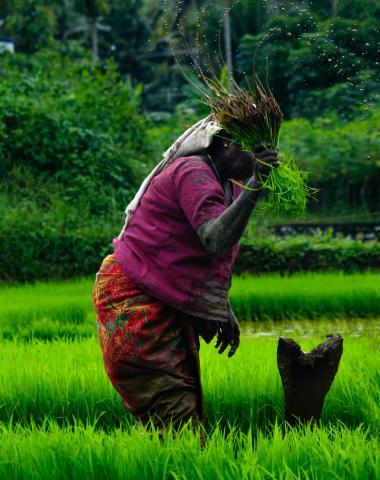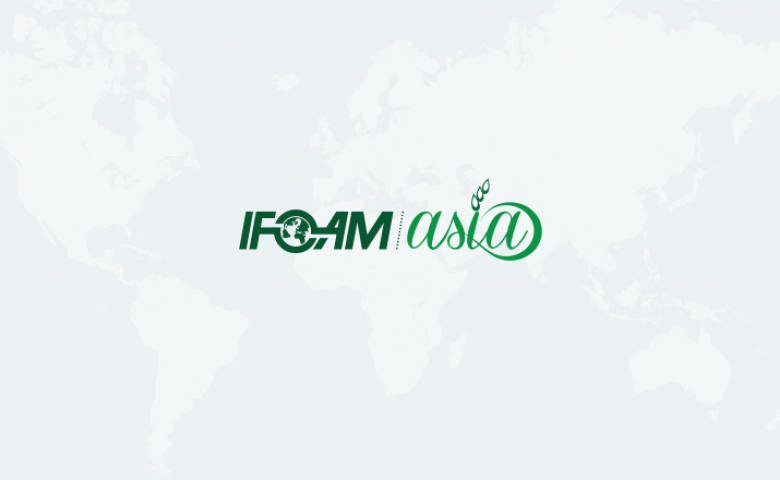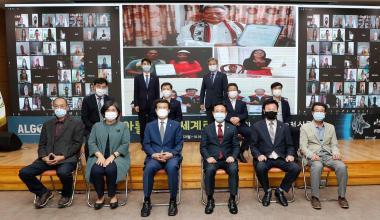IFOAM - Organics International and IFOAM Asia virtually attended the 36th Regional Conference for Asia and the Pacific (36th APRC) of FAO, that was held in a hybrid format. As some participants attended virtually, others attended in-person on invitation from the FAO and hosted in Dhaka, Bangladesh from 8 - 11 March 2022.
The first two days were senior officers' meetings which covered several agendas such as regional and global policy, regulatory matters, and budget matters. There was a lot discussed for instance, the state of food and agriculture in light of the COVID-19 pandemic, promoting climate-resilient agri-food systems, scaling-up inclusive digitalisation in agricultural value chains, identifying One Health priorities, and conserving, restoring, and sustainably using biodiversity for food security and nutrition.
Different stakeholders participated in the discussion and delivered their opinions and suggestions on the way forward. Several side events were organised, and the IFOAM Asia delegation attended the ones on the UN Decade of Family Farming (2019-2028), and the Artificial Fisheries and Aquaculture. The family farming event highlighted and reiterated the critical role of family farmers in facilitating effective responses to the pandemic and transforming food systems into healthier, more resilient, and more sustainable ones. The fisheries side event focused on the importance and opportunities of artificial aquaculture and the fisheries industry.
The final two days were ministerial-related sessions. The discussions revolved around innovation, science, and digitalisation focused on transforming agrifood systems in the Asia and Pacific region while prioritising country and regional needs. The roundtable sessions were conducted on how to make greener and better agrifood systems after COVID-19, and climate actions for resilience and sustainability. Honourable Vice President of Japan (Ministry of Agriculture, Forestry and Fisheries) mentioned that Japan planed to reduce the use of chemical inputs in the farming practice by around 50% by 2050 considering human health and the environment. The Republic of Korea representative mentioned different initiatives, including school meal programs, smart initiatives for young groups, and other various sustainable agriculture initiatives to address SDG goals 1 and 2. Indonesia's agriculture minister also mentioned that organic farming is one of the ways to address climate change and mitigate green-house gas emission from agriculture.
Before the 36th FAO Asia and Pacific session, the IFOAM representatives had attended the Civil Society Organizations (CSO) Consultation meeting on 3 and 4 March. The CSO is a self-organised meeting held before the FAO Asia-Pacific Regional Conference (APRC) to gather key actors from different constituencies and countries to discuss critical topics pertinent to the region, evaluate, and recommend to the FAO regional session. IFOAM Asia representative, Dr. Shaikh Tanveer Hossain, joined as a panel of reactors of a session, State of Food and Agriculture (SOFA), from the lens of grassroots organizations/social movements. He reacted on two aspects.
First, during the current COVID-19 pandemic, there is an increase in consumers' demand for healthy, safe, and organic food. But at the same time, product trustworthiness is essential from the consumers' point of view, and the local certification and traceability system should improve to sustain this momentum. Secondly, the agricultural insurance system must be initiated and enhanced in the Asia-pacific countries. It is not only for crops, livestock, or fisheries sectors due to weather conditions or natural disasters, but also unpredictable situations like covid-19. When people were asked to stay home or in a lockdown situation, farmers were in the field taking risks of health.
The CSO consultation statement was later delivered in the main 36th APRC session. It asks governments to shift public spending (subsidies, procurement) away from industrial farming, towards supporting agro-ecological systems done by peasants and family farmers. This includes subsidies during transition, support for research, innovation, extension and value addition for agroecology, as well as implementing procurement policies in public institutions that prioritise produce from local, agro-ecological farms, forests and sustainable fisheries.
In the last session on the final day, the draft report of conference was adopted. The 36th FAO APRC reiterated the importance of regional cooperation for resilience against challenges to making better and greener agri-food transformation in Asia and Pacific region. This would be done with a focus on green technology, local food-systems improvement, more robust and inclusive new working style due to the pandemic, social protection for vulnerable and marginal peoples, inclusive and resilient agro-food systems with smooth high-value commodity, access of food to all, reduction of food loss and wastage, among others.
FAO strategy on climate change (2022-2031) and urgency of immediate action on future global climate risks are also discussed. The conference emphasised on environmental and human nutritional health for greener agricultural productivity, inclusiveness, family farming, and sustainable food systems; topics that the IFOAM community resonates with. Further cooperation with FAO and like-minded international organizations and networks can be developed for the strategies and synergy for regional prosperity and sustainability.
This article was prepared by Dr. Shaikh Tanveer Hossain, an ambassador of IFOAM - Organics International and Asian Local Governments for Organic Agriculture (ALGOA). He is also a former Vice-President of IFOAM Asia. To contact him, you can reach him by email: tanveer107@yahoo.com


